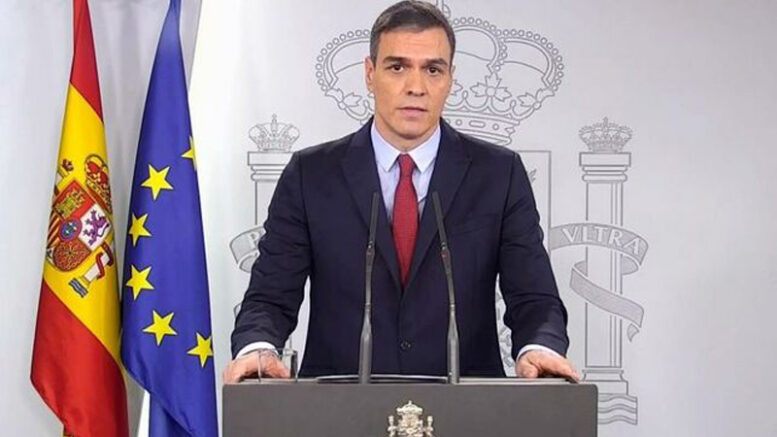After a grueling seven-hour meeting of the government’s Council of Ministers executive cabinet, Spanish President Pedro Sánchez announced late Saturday a series of restrictions and measures set out in a decree declaring a “state of alarm” throughout Spain that sharply restrict the movements of individuals and are aimed at guaranteeing the supply of necessary goods and medical services, while reducing the spread of the coronavirus throughout the country.
Speaking during a nationally televised press conference Saturday night, Sánchez warned that the measures passed by the Consejo “are drastic and have consequences” for all Spaniards as he set out one-by-one the eight specific measures that limit travel and movement are meant to drastically reduce contact between people except in absolutely necessary circumstances. The decree was published late Saturday in the government’s official Boletín Oficial del Estado gazette and the measures took effect in midnight.
During the press conference, Sanchez made clear that while coordination with regional governments across Spain will continue, the sole competent authority throughout Spain under the “state of alarm” is Spain’s central government.
► News Sources: El Diario, 20minutos and El País …
He named a four-minister council led by Health Minister Salvador Illa, which will have final say over all measures taken to combat the coronavirus epidemic in Spain and said that all Spain’s security and law enforcement agencies, including the regional and local police forces, are to be coordinated by and under the direct orders of Spanish Interior Minister Fernando Grande-Marlaska. The other two ministers named to the council are Defence Minister Margarita Robles and Transport and Mobility Minister José Luis Ábalos.
► ► CLICK ABOVE TO WATCH VIDEO ► ►
Sánchez has indicated that the measures affect the entire Spanish territory for 15 days and may “be extended with the authorization of Congress if necessary.” As of Monday morning, government sources were already indicating the measures could remain in place longer than the initial 15-day period.
News reports at the weekend credited the grueling length of the Council of Ministers meeting Saturday in part to demands by Unidas Podemos leader and the coalition government’s 2nd Vice President for Social Affairs, Pablo Iglesias, that economic measures to cushion workers from the negative impact of the lockdown be put in place at the same time. In addition, reports said Iglesias insisted – unsuccessfully, as it turned out – for having himself named as one of the plenipotentiary ministers that Sanchez appointed to oversee implementation of measures under the state of alarm decree.
► Read full PDF [in Spanish] of Royal Decree on Spain’s ‘State of Alarm’ …
But additional reporting that emerged on Monday morning said the cabinet-level dispute that prolonged Saturday’s meeting went much deeper than just a split between Unidas Podemos ministers and those of Sánchez’s Socialist party, with the biggest dispute over what measures needed to be immediately enacted occurring between Economy Minister Nadia Calviño and Social Security Minister José Luis Escrivá, both non-partisan independents appointed to their posts by Sánchez and both considered to be orthodox economists, at least in theory.
According to those reports, lining up on one side of the debate were Calviño and Finance Minister María Jesús Montero, both expressing great concern about the impact on the federal budget of costly measures that could mount up to an important percentage of Spain’s GDP overall economic output, thereby causing problems for Spain with EU finance authorities and in the financial markets.
► Click to read more in English at: El País, Politico and Bloomberg …
Escrivá is said to have been pushing for more government spending to cushion the impact on workers and households of the anticipated fall in economic activity, throwing fiscal restraint to the wind and pushing for measures that would have an immediate positive impact on the economy. Lining up behind Escrivá were Unidas Podemos ministers, including Iglesias, Yolanda Díaz and Alberto Garzón. But also in the Escrivá camp were the Socialists’ Transport Minister Ábalos and Industry Minister Reyes Maroto.
Responding to a reporter’s question Saturday evening, Sánchez confirmed that there had been discrepancies regarding which economic measures should be put in place to ease the negative impact of the coronavirus epidemic on Spain’s economic activity and said the Consejo had decided to separate out announcement of the economic measures from the emergency health and security measures. He said an additional cabinet meeting of the Consejo this week would decide on the economic measures to be put in place.
► Click to read more news about the Coronavirus epidemic in Spain …
Check out more news from Spain about:
► Animal Welfare ► Corruption/Transparency ► Discrimination ► Education ► Elections ► Environment & Sustainability ► Fair Trade & Development Aid ► Healthcare ► Historical Memory ► Housing & Homelessness ► Human Rights ► Labour & Unemployment ► LGBT+ ► Politics ► Poverty ► Refugees & Migration ► Technology & Social Enterprise ► War & Peace ► Women’s Rights

All images at ProgressiveSpain.com are the copyright of their respective authors/owners and are reproduced here for non-commercial, journalistic purposes in accordance with Fair Use doctrine. All other content is Copyright © 2015-2020 ProgressiveSpain.com and is licensed under a Creative Commons Attribution-NonCommercial-ShareAlike 4.0 International License.

